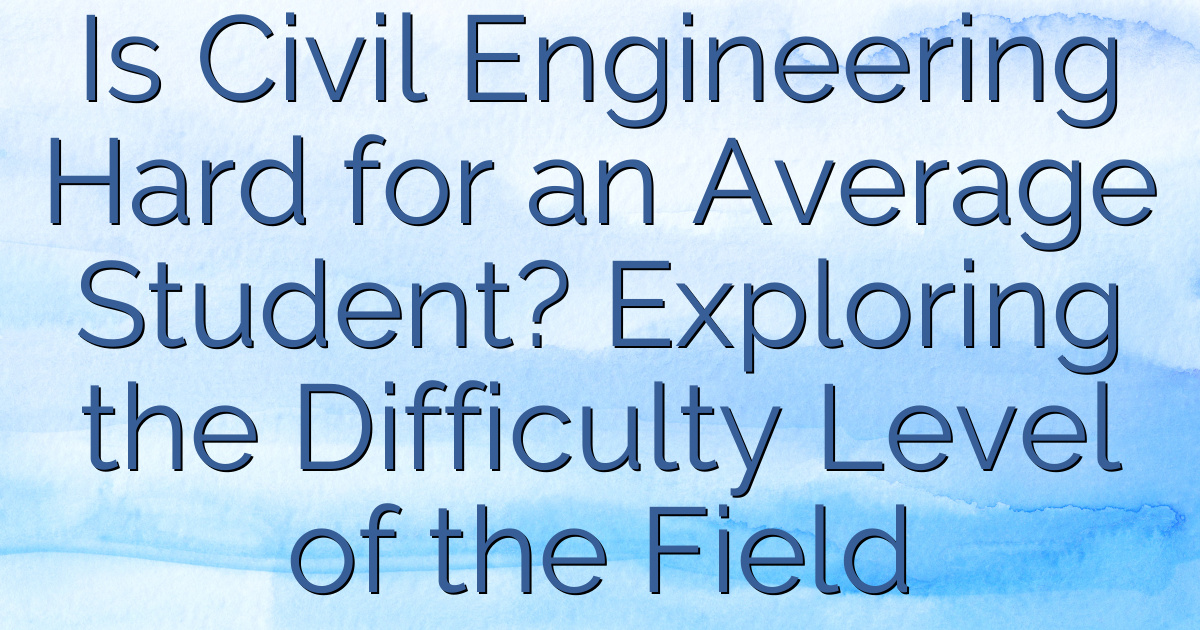
Civil engineering is a challenging field of study that involves the design, construction, and maintenance of infrastructure such as buildings, roads, bridges, and water systems.
Many students are drawn to this field because of its potential for creating long-lasting, impactful structures that serve communities.
However, the question remains: is civil engineering hard for an average student?
Understanding civil engineering is the first step to answering this question. Civil engineering is a broad field that requires a strong foundation in mathematics, physics, and other sciences.
Students must be able to apply these principles to solve complex problems related to structural design, materials science, and environmental engineering.
Additionally, civil engineers must be able to communicate effectively with clients, contractors, and other stakeholders to ensure that projects are completed on time and within budget.
Academic requirements for civil engineering are rigorous, and students must be prepared to dedicate significant time and effort to their studies. This can be a challenge for average students who may struggle with the demanding coursework.
However, there are resources available to help students succeed, including tutoring, study groups, and academic advising. With the right support and dedication, average students can excel in civil engineering and achieve their career goals.
Table of Contents
Key Takeaways – Is Civil Engineering Hard for an Average Student
- Civil engineering is a challenging field that requires a strong foundation in mathematics, physics, and other sciences.
- Academic requirements for civil engineering are rigorous, but resources are available to help students succeed.
- With the right support and dedication, average students can excel in civil engineering and achieve their career goals.
Understanding Civil Engineering
Civil engineering is a branch of engineering that deals with the design, construction, and maintenance of the built environment. It is a broad field that encompasses a wide range of activities, from the planning and design of buildings, bridges, and roads to the management and maintenance of infrastructure.
To become a civil engineer, one must possess strong math and science skills, as well as an understanding of engineering principles and practices. A civil engineer must be able to work with others, communicate effectively, and think creatively to solve complex problems.
Civil engineering is a challenging field that requires a lot of hard work and dedication. It involves long hours of study and practice, as well as the ability to work under pressure and meet tight deadlines. However, with the right training and experience, a civil engineer can have a rewarding and fulfilling career.
Civil engineering is a diverse field that offers many opportunities for specialization. Some civil engineers work in construction, while others work in research and development. Some specialize in transportation, while others focus on environmental engineering or structural engineering.
Overall, civil engineering is a challenging but rewarding field that requires a lot of hard work and dedication. With the right skills and training, an average student can succeed in this field and have a fulfilling career.
Academic Requirements for Civil Engineering
To become a civil engineer, students must meet certain academic requirements. These requirements vary depending on the institution and the country. However, some common academic requirements for civil engineering students are:
- High school diploma or equivalent: Students must have a high school diploma or equivalent to enroll in a civil engineering program. In some countries, students may need to complete additional coursework in math and science to be eligible for admission.
- Strong math skills: Civil engineering is a math-intensive field, and students must have a strong foundation in calculus, trigonometry, and geometry. They must also be proficient in algebra and statistics.
- Science courses: Students must have a solid foundation in science, including physics and chemistry. These courses help students understand the physical principles that underlie civil engineering.
- Computer skills: Civil engineers use computer programs to design and analyze structures, so students must be proficient in computer skills. They should be familiar with computer-aided design (CAD) software, programming languages, and other relevant software.
- Communication skills: Civil engineers work in teams, and they must be able to communicate their ideas effectively. Therefore, students must have strong oral and written communication skills.
Overall, civil engineering is a challenging field that requires a strong academic background. Students must be prepared to work hard and dedicate themselves to their studies to succeed in this field.
Challenges Faced by Average Students in Civil Engineering
Civil engineering is a challenging field that requires a deep understanding of complex mathematical concepts, rigorous coursework, and excellent time management skills. It is no wonder that many students find it difficult to keep up with the demands of this major. This section will explore some of the challenges faced by average students in civil engineering.
Complex Mathematical Concepts
Civil engineering is a math-intensive field that requires a solid foundation in calculus, differential equations, and linear algebra. Many students struggle with these concepts, which can make it difficult to succeed in civil engineering courses. Additionally, civil engineering courses often involve applying these mathematical concepts to real-world problems, which can be challenging for students who are not comfortable with math.
Rigorous Coursework
Civil engineering courses are known for their rigor and intensity. Students are expected to complete a large amount of coursework, including lab work, design projects, and research papers. This can be overwhelming for students who are not used to such a heavy workload. Additionally, civil engineering courses often require students to work in teams, which can be challenging for students who prefer to work independently.
Time Management Issues
Civil engineering students must be excellent time managers. They are often required to juggle multiple classes, lab work, design projects, and extracurricular activities. This can be difficult for students who are not used to managing their time effectively. Additionally, civil engineering courses often have strict deadlines, which can be stressful for students who struggle with time management.
In conclusion, civil engineering is a challenging field that requires a deep understanding of complex mathematical concepts, rigorous coursework, and excellent time management skills. Average students may struggle with these challenges, but with hard work and dedication, they can succeed in this rewarding field.
What are the specific challenges and difficulties that an average student may face in studying civil engineering?
Studying civil engineering presents unique challenges for average students, ranging from complex theoretical concepts to demanding practical applications. Balancing a heavy workload, mastering advanced mathematics, and understanding intricate design principles are just a few of the challenges of civil engineering that students must navigate to succeed in this rigorous field.
Skills Needed to Excel in Civil Engineering
Civil engineering is a challenging profession that requires a combination of technical, analytical, and soft skills. Here are some of the essential skills that an average student needs to excel in civil engineering:
Analytical Skills
Civil engineers need to have strong analytical skills to solve complex problems and develop innovative solutions. They must be able to analyze data, interpret results, and make informed decisions based on their findings. Analytical skills are crucial when designing structures, developing plans, and conducting feasibility studies. Civil engineers must also be able to use software programs to aid in design calculations and renderings.
Problem-Solving Skills
Problem-solving skills are essential for civil engineers. They must be able to identify problems, evaluate options, and develop effective solutions. Civil engineers face many challenges, such as budget constraints, environmental concerns, and safety issues. They must be able to think critically and creatively to address these challenges and find solutions that meet the needs of their clients.
Communication Skills
Civil engineers must have excellent communication skills to work effectively with clients, colleagues, and stakeholders. They must be able to convey complex technical information to non-technical audiences, such as government officials, community members, and project managers. Civil engineers must also be able to work collaboratively with architects, contractors, and other professionals to ensure that projects are completed on time, within budget, and to the satisfaction of all stakeholders.
In summary, to excel in civil engineering, an average student needs to have a combination of technical, analytical, and soft skills. Analytical skills are crucial for analyzing data, interpreting results, and making informed decisions. Problem-solving skills are essential for identifying problems, evaluating options, and developing effective solutions. Communication skills are necessary for working effectively with clients, colleagues, and stakeholders.
Support for Average Students in Civil Engineering
Civil engineering is a challenging field that requires a strong foundation in math and science. For average students, this can be a daunting task. However, there are many resources available to support students who are struggling with the coursework.
Tutoring and Study Groups
One of the best ways for average students to get extra help is through tutoring and study groups. Many universities offer tutoring services for students, and there are also many private tutoring companies that specialize in math and science. Study groups are another great option, as they allow students to work together to solve problems and share knowledge.
Online Resources
The internet is a great resource for students who are struggling with civil engineering coursework. There are many websites and online forums that provide information and support for students. Some popular websites include Khan Academy, Coursera, and edX. These websites offer free courses and tutorials on a wide range of topics, including math and science.
Faculty Support
Finally, students should not hesitate to seek support from their professors and academic advisors. Faculty members are often more than happy to help students who are struggling with coursework. They can provide extra help during office hours, offer advice on study strategies, and provide guidance on course material.
In conclusion, civil engineering can be a challenging field for average students. However, there are many resources available to help students succeed. By taking advantage of tutoring and study groups, online resources, and faculty support, students can overcome the challenges of civil engineering coursework and achieve their academic goals.
Success Stories of Average Students in Civil Engineering
Civil engineering is a challenging field that requires a lot of hard work and dedication. However, many average students have succeeded in this field and have gone on to have successful careers.
One such success story is that of John Smith. John was an average student in high school and struggled with math and science. However, he was determined to pursue a career in civil engineering and worked hard to improve his grades. He attended a community college and then transferred to a four-year university to complete his degree. Despite the challenges he faced, John graduated with a degree in civil engineering and went on to work for a top engineering firm.
Another success story is that of Jane Doe. Jane was also an average student in high school and struggled with math and science. However, she was passionate about civil engineering and was determined to succeed. She attended a four-year university and worked hard to improve her grades. She participated in internships and extracurricular activities related to civil engineering, which helped her gain valuable experience and skills. After graduation, Jane landed a job at a top engineering firm and quickly rose through the ranks.
These success stories demonstrate that it is possible for average students to succeed in civil engineering. While it may be challenging, with hard work and dedication, anyone can achieve their goals.
